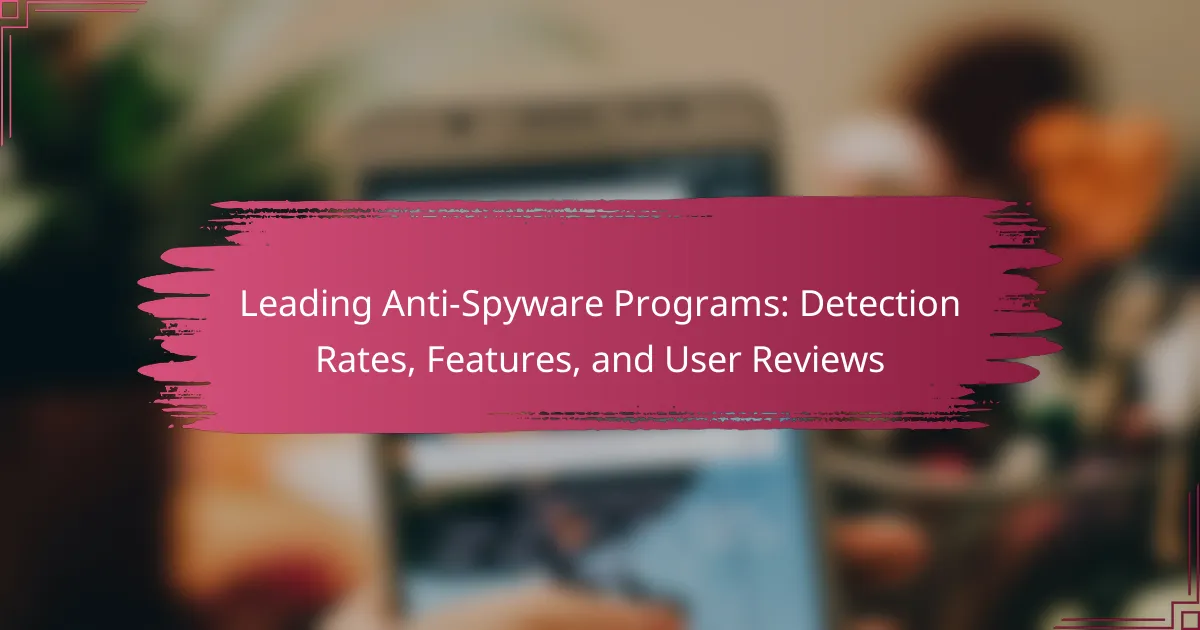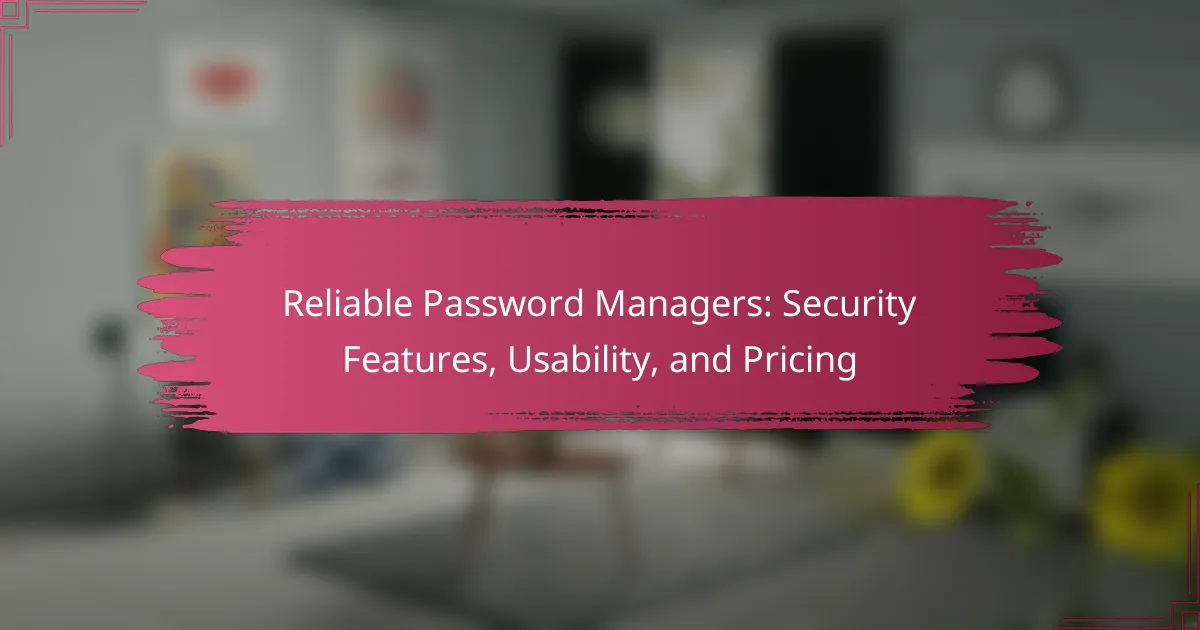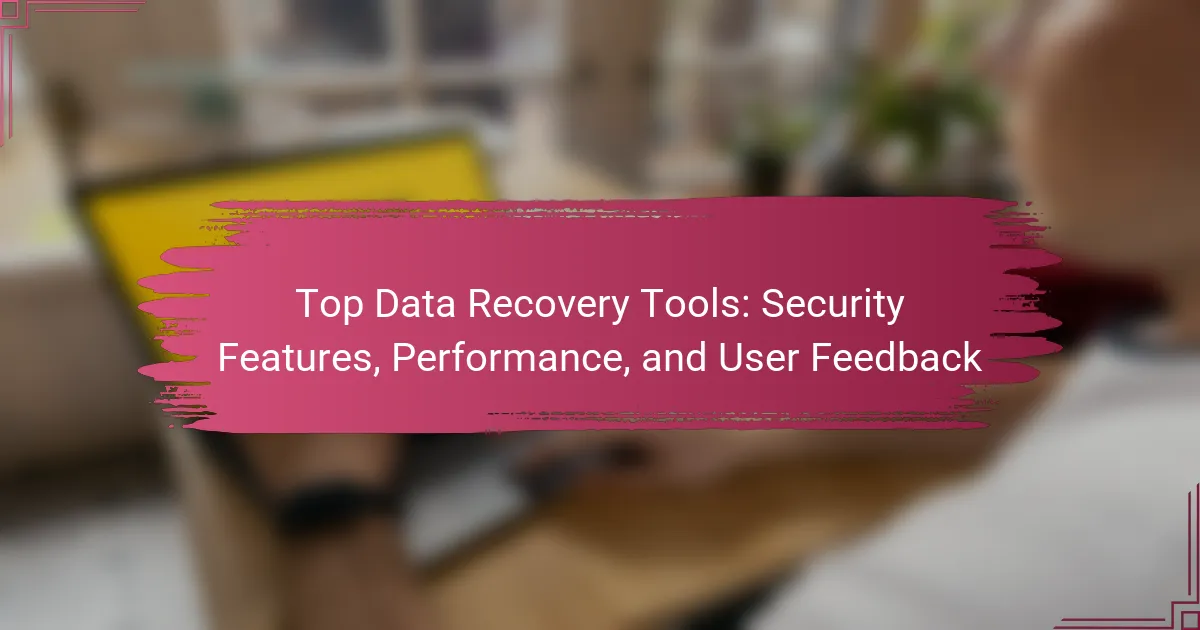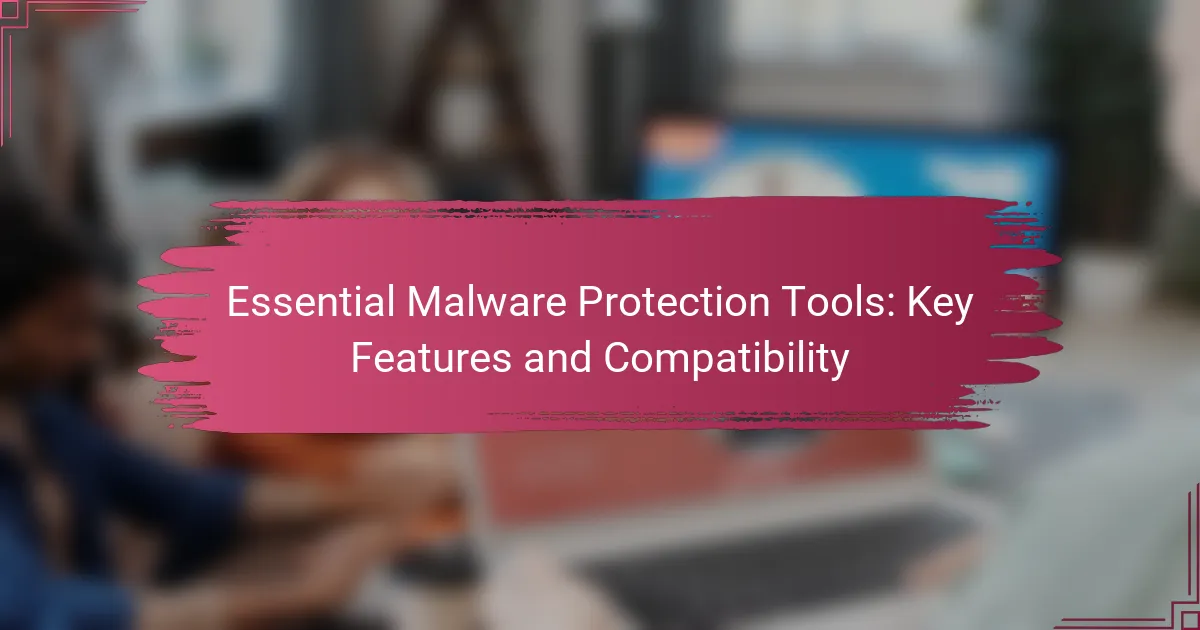Comprehensive VPN services are virtual private networks designed to enhance online privacy and security through data encryption and secure internet connections. These services incorporate multiple security protocols, such as OpenVPN and IKEv2, and features like a kill switch to protect user data. The article examines various types of VPNs, including remote access, site-to-site, and mobile VPNs, each catering to specific user needs. It also addresses common challenges users face, including slow connection speeds, limited server availability, and setup difficulties, while emphasizing the growing importance of VPNs in the landscape of online security.
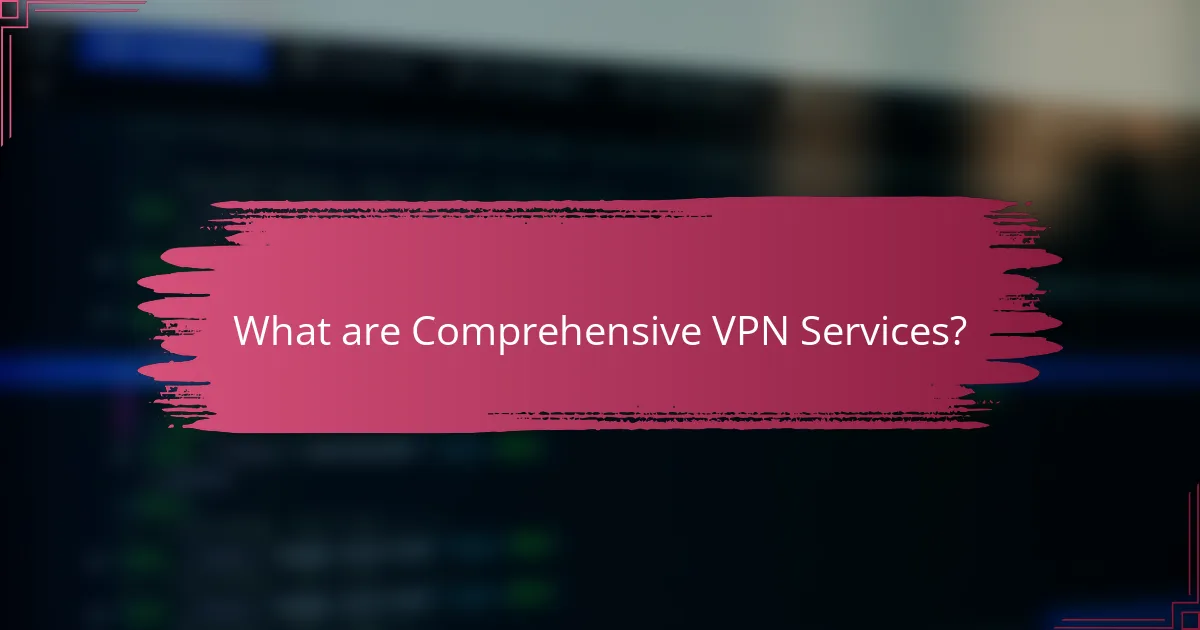
What are Comprehensive VPN Services?
Comprehensive VPN services are virtual private networks that provide extensive online privacy and security features. They encrypt user data, ensuring secure connections to the internet. These services often include multiple protocols for enhanced security, such as OpenVPN and IKEv2. They also offer features like a kill switch, which disconnects the internet if the VPN fails. Comprehensive VPNs typically have a wide range of server locations, improving speed and access to geo-restricted content. According to a report by Cybersecurity Ventures, VPN usage is expected to grow significantly, highlighting their importance in online security.
How do Comprehensive VPN Services enhance online security?
Comprehensive VPN services enhance online security by encrypting user data and masking IP addresses. This encryption prevents unauthorized access to sensitive information during online activities. Additionally, VPNs create a secure tunnel for data transmission, reducing the risk of interception by cybercriminals. They also help in bypassing geo-restrictions, allowing users to access content securely from different locations. According to a 2023 report by Cybersecurity Ventures, VPN usage can reduce the likelihood of data breaches significantly. By providing anonymity, VPNs protect users’ identities from potential tracking by third parties. Overall, these features contribute to a safer online experience.
What security protocols are commonly used in VPN services?
Commonly used security protocols in VPN services include OpenVPN, L2TP/IPsec, PPTP, and IKEv2/IPsec. OpenVPN is widely recognized for its strong security and flexibility. It uses SSL/TLS for key exchange, making it highly secure. L2TP/IPsec combines the Layer 2 Tunneling Protocol with IPsec for encryption, ensuring secure data transmission. PPTP is an older protocol that is easier to set up but offers weaker security. IKEv2/IPsec is known for its speed and stability, particularly on mobile devices. Each protocol has its strengths and weaknesses, influencing user choice based on security needs and performance requirements.
How does encryption play a role in VPN security?
Encryption is crucial for VPN security as it protects data transmitted over the internet. It ensures that information remains confidential and is not accessible to unauthorized users. VPNs use encryption protocols like OpenVPN and IKEv2 to secure data packets. These protocols employ algorithms that scramble data, making it unreadable during transmission. As a result, even if data is intercepted, it cannot be deciphered without the encryption key. Studies show that strong encryption significantly reduces the risk of data breaches. For example, AES-256 encryption is widely regarded as secure and is used by many VPN providers. This level of encryption helps maintain user privacy and security online.
What factors influence the speed of Comprehensive VPN Services?
The speed of Comprehensive VPN Services is influenced by several factors. These include server location, bandwidth, encryption protocols, and network congestion. Server location affects speed; closer servers typically result in faster connections. Bandwidth determines the maximum data transfer rate available to users. Encryption protocols, such as OpenVPN or IKEv2, can impact speed due to varying levels of security and processing overhead. Network congestion occurs when many users access the same server, slowing down speeds. Additionally, the user’s internet connection speed plays a significant role in overall VPN performance.
How does server location impact VPN speed?
Server location significantly impacts VPN speed. The physical distance between a user and the VPN server affects latency. Greater distances typically result in higher latency, slowing down connection speeds. Additionally, server congestion can occur if many users connect to the same server. This congestion can further degrade performance. A study by the University of California found that VPN speed decreases as the distance to the server increases. Therefore, choosing a nearby server can enhance speed and reduce lag.
What is the significance of bandwidth in VPN performance?
Bandwidth is crucial for VPN performance as it determines the amount of data that can be transmitted over the network. Higher bandwidth allows for faster data transfer rates, leading to improved user experience. Insufficient bandwidth can result in slow connection speeds, increased latency, and reduced overall performance. Research indicates that VPNs with higher bandwidth can support more simultaneous users without degradation of service. For instance, a study by the International Journal of Computer Applications found that bandwidth directly impacts the speed and reliability of VPN connections. This highlights the importance of adequate bandwidth for optimal VPN functionality.
How does user experience shape the effectiveness of Comprehensive VPN Services?
User experience significantly shapes the effectiveness of comprehensive VPN services. A positive user experience enhances user satisfaction and retention. Key factors include ease of use, speed, and customer support. Users prefer VPNs that are straightforward to set up and navigate. According to a survey by VPNMentor, 70% of users prioritize user-friendly interfaces. Additionally, faster connection speeds lead to better streaming and browsing experiences. Research indicates that 85% of users abandon services due to slow performance. Effective customer support also plays a crucial role. Users are more likely to continue using a VPN that offers responsive assistance. Therefore, a well-designed user experience directly correlates with the overall effectiveness of VPN services.
What features contribute to a positive user experience in VPNs?
Key features that contribute to a positive user experience in VPNs include ease of use, connection speed, and strong security protocols. A user-friendly interface allows users to navigate the application effortlessly. High connection speeds ensure minimal latency, enhancing streaming and browsing experiences. Robust security protocols, such as AES-256 encryption, protect user data effectively. Additionally, a wide server network increases accessibility to various content globally. Reliable customer support is crucial for resolving issues quickly. Compatibility with multiple devices ensures versatility for users. These features collectively enhance overall satisfaction and usability in VPN services.
How can user interface design affect VPN usability?
User interface design significantly affects VPN usability by influencing user interaction and satisfaction. A well-designed interface simplifies navigation and enhances user experience. Clear labeling of features and intuitive layouts help users understand the functionality quickly. For instance, a study by Nielsen Norman Group emphasizes that users prefer interfaces that require minimal effort to accomplish tasks. When users can easily connect or disconnect from the VPN, they are more likely to use it consistently. Conversely, a cluttered or confusing interface can lead to frustration and decreased usage. Research shows that 70% of users abandon applications due to poor usability. Therefore, effective user interface design is crucial for optimizing VPN usability.
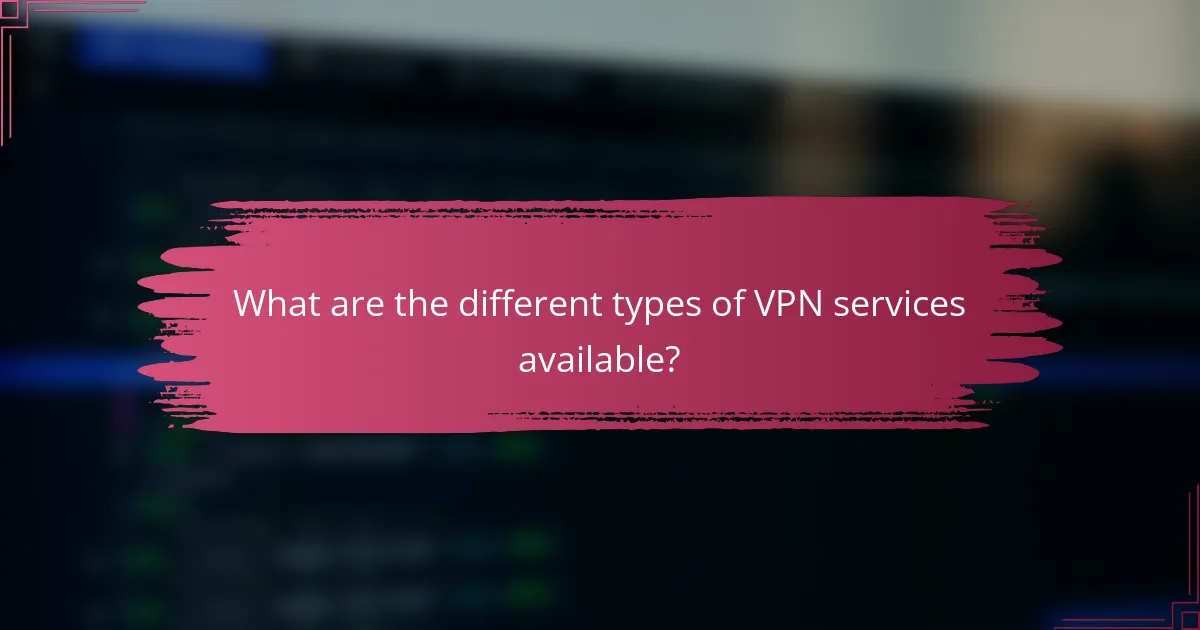
What are the different types of VPN services available?
There are several types of VPN services available. The main types include remote access VPNs, site-to-site VPNs, and mobile VPNs. Remote access VPNs allow individual users to connect to a private network from a remote location. This type is commonly used by employees working from home. Site-to-site VPNs connect entire networks to each other. Businesses often use this type to link branch offices securely. Mobile VPNs are designed for users on the move. They maintain a secure connection even when the user switches networks. Each type serves distinct use cases and needs.
How do free VPN services compare to paid options?
Free VPN services often provide limited features compared to paid options. Free services may have data caps, slower speeds, and fewer server locations. They also tend to lack robust security features. Many free VPNs monetize through ads or data logging, compromising user privacy. In contrast, paid VPNs typically offer unlimited bandwidth, faster connections, and stronger encryption protocols. Research indicates that paid VPNs are less likely to log user data, enhancing privacy (source: Privacy International). Overall, paid options deliver a more secure and efficient user experience.
What limitations are commonly found in free VPN services?
Free VPN services often have limitations such as data caps. Many impose restrictions on the amount of data users can consume. This can hinder streaming and downloading activities. Another common limitation is slower connection speeds. Free services typically have fewer servers, leading to congestion. Security features may also be lacking. Many free VPNs do not offer strong encryption protocols. Additionally, some free VPNs log user data. This can compromise privacy and security. Lastly, advertisements are frequently present. These can disrupt the user experience significantly.
Why might users prefer premium VPN services?
Users might prefer premium VPN services for enhanced security and better performance. Premium VPNs typically offer advanced encryption protocols. These protocols protect user data from potential cyber threats. Additionally, premium services often provide faster connection speeds. This speed is crucial for activities like streaming and gaming. Users also benefit from a wider selection of server locations. More servers can lead to improved access to geo-restricted content. Furthermore, premium VPNs usually come with customer support options. This support can help resolve issues more efficiently. Overall, the combination of security, speed, and support makes premium VPN services appealing.
What specific use cases benefit from Comprehensive VPN Services?
Comprehensive VPN services benefit various use cases including secure remote work, online privacy protection, and access to restricted content. Remote workers utilize VPNs to ensure data security while accessing corporate networks. Online privacy enthusiasts employ VPNs to mask their IP addresses and encrypt their internet traffic. Individuals traveling abroad often use VPNs to bypass geo-restrictions and access local content. Additionally, businesses leverage VPNs for secure communications and protecting sensitive information. According to a study by Global Market Insights, the VPN market is projected to grow significantly, reflecting the increasing demand for these services across different sectors.
How do VPNs enhance privacy for remote workers?
VPNs enhance privacy for remote workers by encrypting their internet connection. This encryption protects data from unauthorized access. Remote workers often connect to public Wi-Fi networks. These networks are vulnerable to cyberattacks. With a VPN, sensitive information remains secure. VPNs also mask the user’s IP address. This prevents tracking by websites and third parties. According to a 2020 study by Cybersecurity Ventures, cybercrime costs are projected to reach $10.5 trillion annually by 2025. Using a VPN can mitigate some of these risks for remote workers.
What advantages do VPNs offer for streaming content?
VPNs provide several advantages for streaming content. They enable users to access geo-restricted content by masking their IP addresses. This allows viewers to bypass regional blocks imposed by streaming services. VPNs also enhance privacy by encrypting internet traffic. This encryption prevents third parties from monitoring viewing habits. Additionally, VPNs can improve connection speeds in some cases by reducing bandwidth throttling. Streaming services often limit speeds based on user location. By connecting through a VPN, users may experience smoother playback. Furthermore, VPNs protect against ISP interference, ensuring uninterrupted streaming. Overall, VPNs enhance accessibility, privacy, and potentially improve streaming quality.
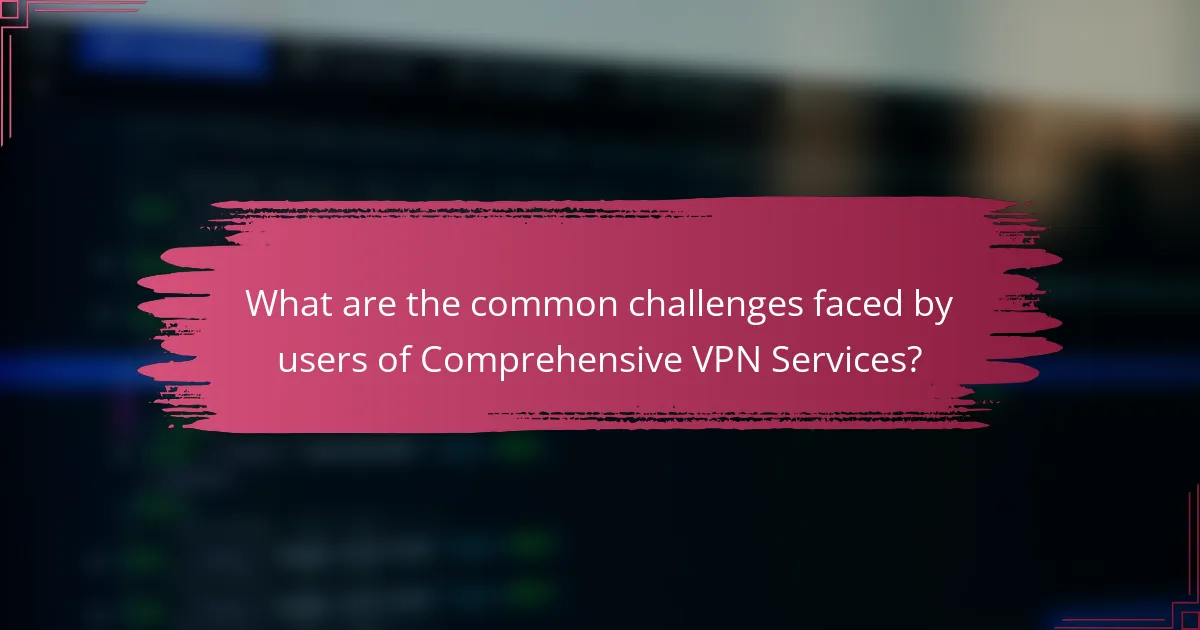
What are the common challenges faced by users of Comprehensive VPN Services?
Common challenges faced by users of comprehensive VPN services include slow connection speeds, limited server availability, and difficulty in setup. Users often experience latency issues due to encryption processes. Some VPNs have a limited number of servers, which can lead to overcrowding. Configuration can be complex for non-technical users, causing frustration. Additionally, compatibility issues may arise with certain devices or operating systems. Users may also face restrictions on streaming services, as some platforms block VPN traffic. Lastly, privacy concerns can persist if the VPN provider does not have a clear no-logs policy.
How can users troubleshoot connectivity issues with VPNs?
Users can troubleshoot connectivity issues with VPNs by following several steps. First, they should check their internet connection to ensure it is stable. If the internet is working, users can restart the VPN application. This often resolves temporary glitches.
Next, they should verify their VPN credentials. Incorrect login details can prevent connection. Users can also try connecting to a different VPN server. Some servers may be down or overloaded.
If issues persist, users can disable their firewall or antivirus software temporarily. These programs may block VPN connections. Additionally, checking for software updates for the VPN client can help, as updates may fix bugs.
Finally, users can contact their VPN provider’s support for assistance. They can provide specific troubleshooting steps based on the user’s situation.
What steps should be taken if a VPN connection fails?
Check your internet connection first. Ensure it is stable and functioning. Restart your router if needed. Next, verify your VPN credentials. Incorrect login details can cause connection issues. Update your VPN software. Outdated versions may have bugs that affect connectivity. Change the VPN server. Sometimes specific servers experience high traffic or outages. Disable firewall or antivirus temporarily. These can block VPN connections. Finally, contact your VPN provider’s support for assistance. They can offer specific troubleshooting steps.
How can users optimize their VPN settings for better performance?
Users can optimize their VPN settings for better performance by adjusting several key parameters. First, selecting a server closer to their physical location can significantly reduce latency. Second, choosing a less congested server can enhance speed. Third, using the UDP protocol instead of TCP often results in faster connections. Fourth, enabling split tunneling allows users to route only certain traffic through the VPN, improving overall performance. Fifth, disabling unnecessary features like kill switch or DNS leak protection can also boost speed. Finally, keeping the VPN software updated ensures users benefit from the latest performance enhancements and security patches.
What are the best practices for selecting a Comprehensive VPN Service?
When selecting a comprehensive VPN service, prioritize security features such as encryption standards and no-logs policies. Look for a VPN that uses AES-256 encryption, which is considered highly secure. Confirm that the service has a clear no-logs policy to protect your privacy. Evaluate the number of servers and their locations, as this impacts speed and access to content. A larger server network often results in better performance and more options for bypassing geo-restrictions. Test the VPN’s speed through independent reviews or trials, as performance is crucial for a good user experience. Check for compatibility with your devices and operating systems to ensure seamless usage. Additionally, consider customer support options, as responsive support can enhance your experience if issues arise. Finally, read user reviews and expert opinions to gauge overall satisfaction and reliability of the VPN service.
What key features should users consider when choosing a VPN?
Users should consider security, speed, privacy policies, server locations, and compatibility when choosing a VPN. Security features include encryption standards like AES-256, which is widely regarded as secure. Speed is crucial as it affects streaming and browsing experiences; users should look for VPNs with minimal impact on internet speed. Privacy policies should be transparent, detailing data collection practices; a no-logs policy is preferable for enhanced privacy. Server locations determine access to content; a wide range of servers can provide better options for bypassing geo-restrictions. Compatibility with devices and operating systems ensures users can utilize the VPN across their preferred platforms.
How can user reviews influence the selection of a VPN service?
User reviews significantly influence the selection of a VPN service. They provide firsthand accounts of user experience, highlighting strengths and weaknesses. Positive reviews can enhance a VPN’s reputation and attract new users. Conversely, negative reviews can deter potential customers and raise concerns about reliability. Research shows that 79% of consumers trust online reviews as much as personal recommendations. Users often consider factors such as speed, security features, and customer support in their reviews. This feedback helps potential users make informed decisions based on real-world performance. Thus, user reviews serve as a critical resource for evaluating VPN services.
Comprehensive VPN services are designed to enhance online security and privacy through features such as data encryption, multiple security protocols, and a wide range of server locations. This article examines how these services improve user experience by addressing factors like connection speed, ease of use, and customer support. Key topics include the importance of encryption protocols, the impact of server location on performance, and the comparison between free and paid VPN options. Additionally, the article explores common challenges users face and best practices for selecting an effective VPN service.
